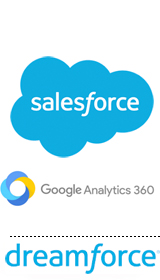 Salesforce is partnering with Google for an integration that will enable sales, marketing and advertising data to flow across the Analytics 360 Suite and Salesforce’s Marketing and Sales clouds. Read the Google blog post.
Salesforce is partnering with Google for an integration that will enable sales, marketing and advertising data to flow across the Analytics 360 Suite and Salesforce’s Marketing and Sales clouds. Read the Google blog post.
The integrations of 360 and Salesforce’s Marketing and Sales clouds will be available in the first half of 2018 at no additional cost, the companies said Monday at Salesforce’s Dreamforce conference in San Francisco. Until now, there were no pre-existing integrations between Analytics 360 and Salesforce, so they had to be used separately.
The integration between Analytics 360 and Marketing Cloud will help marketers for the first time build custom audiences in Analytics 360 that can be directed to the Marketing Cloud and activated across direct marketing channels. Marketers will also score a holistic dashboard for their consumer engagement data so they can better gauge how campaigns are performing, such as whether customers who received email promotions clicked to learn more or ended up buying a product. Marketing Cloud data related to any interactions between brands and customers will be visible in 360, allowing marketers to create audience lists.
Salesforce Sales Cloud customers will be able to tap Google’s ad platforms to gain a granular view of the sales cycle and understand how customers interact with a brand. Marketers will be able to build more detailed audience segments and enhance their ability to convert prospects and identify new customers. They can also use the sales data in 360 for attribution and bid optimization.
Salesforce and Google executives said the integration was in response to customers clamoring for an easier way to import data from one system to the other so they could take action. The move will be a positive development for marketers, said Martin Kihn, vice president of research at Gartner.
“Users of Salesforce Marketing Cloud will find it convenient when it becomes available because most of them also use Google Analytics,” Kihn said.
The Google-Salesforce partnership also includes an integration between Salesforce and Google’s G Suite. Salesforce Lightening will hook up with Gmail and Google Sheets, and there will also be new Quip Live Apps for Google Drive and Calendar. The Lightening for Gmail, Calendar and Drive integrations are already complete, but deeper integrations are planned for 2018. Select Salesforce customers will receive free G Suite licenses for one year.
G Suite will become Salesforce’s preferred email and productivity provider, while Google’s Cloud Platform will be used for Saleforce’s core services as Salesforce expands its infrastructure globally.
This post was syndicated from Ad Exchanger.

More Stories
Inside AB InBev’s Strategy For Tapping Into First-Party Data
PMX New Zealand sponsors Ehrenberg-Bass
Chief Sustainability Officers Aren’t Marketers, They’re Multi-Hyphenates